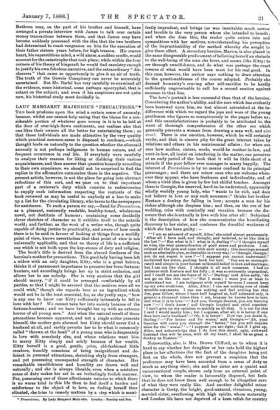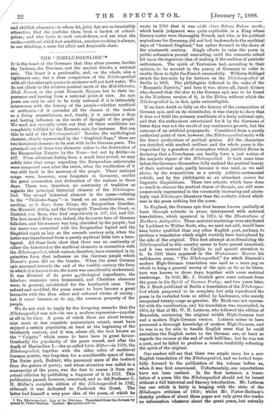LADY MARGARET MAJENDIE'S "PRECAUTIONS."* Tills book produces upon the mind
a certain sense of anomaly, because, whilst one cannot help seeing that the blame for a con. siderable portion of whatever goes wrong in it is to be laid at the door of over-high-flown sentiments, one realises also that one likes their owners all the better for entertaining them ; so that these individuals are made attractive by the very quality which practical common-sense is disposed to condemn,—which thought leads on naturally to the question whether the aforesaid anomaly is not perhaps indigenous to human nature, and of frequent occurrence in real life. If everybody were carefully to analyse their reasons for liking or disliking their various acquaintances, and then answer that question honestly according to their own experience, we should not be surprised to find the replies in the affirmative outnumber those in the negative. The present article, however, is not the place for going into abstract reflections of this sort, and we pass on to that important part of a reviewer's duty which consists in endeavouring to supply such information respecting the contents of the book reviewed as may be useful to anybody at a loss to make up a list for the circulating library, who turns to the newspapers for assistance. To such a person we say,—Send for Precautions, as a pleasant, eminently readable, healthy-toned, wholesome novel, not destitute of humour ; containing some decidedly clever sketches of character as it exhibits itself to the outside world; and further, as the work of a writer who, though quite capable of doing justice to practicality, and aware of how much there is to be said in favour of looking at things from a worldly point of view, knows nevertheless that that point of view is not universally applicable, and that no theory of life is a sufficient one which is not built upon the key-stones of duty and religion.
The book's title is derived from the absurd fondness of the heroine's mother for precautions. This good lady having been left a widow with an only daughter, Kitty, who is a great heiress, thinks it of paramount importance to preserve her from fortune- hunters, and accordingly brings her up in strict seclusion, and allows her to see nobody. She is very anxious that the girl should marry, "if it could be arranged comfortably by all parties, so that I might be assured that the motives were all we could wish," though she regards love as an ingredient which would not be in the least essential, for, as she justly says, "how is any one to know our Kitty sufficiently intimately to fall in love with her ? We cannot take her into society because of the fortune-hunters ; and we have brought her up with an extreme horror of all young men." And when the natural result of these precautions becomes apparent, and not a single suitor presents himself, the mother gets alarmed lest Kitty should never find a husband at all, and rashly permits her to be what is commonly called "thrown at the head" of a young man who is desperately in love with somebody else, and whose relations want him to marry Kitty simply and solely because of her wealth. Kitty herself is a good, gentle, prim, old-fashioned little creature, humbly conscious of being insignificant and de- ficient in personal attractions, shrinking shyly from strangers, and yet possessing unsuspected strength of character. Her remarkable unselfishness and humility are drawn well and naturally ; and she is always likeable, even when a mistaken sense of duty makes her act in an irritatingly foolish manner. For, possessing one of those affectionate natures to which there is no worse trial in this life than to feel itself a burden and misfortune to the object of ts love, on finding herself thus situated, she tries to remedy matters by a step which is mani-
* Precautions. By Lady Margaret Majendie. London: Bentley and Son.
festly imprudent, and brings (as was inevitable) much sorrow and trouble to the very person whom she intended to benefit; and when she does this, the reader quite enters into and sympathises with her motives, notwithstanding his perception of the impracticability of the method whereby she sought to give them effect. A secondary heroine, Marion, is also placed in the same disagreeable predicament of believing herself an obstacle to the well-being of the man she loves, and seems (like Kitty) to err through unselfishness, and do what was perhaps the exact
reverse of what would have been most for his real good. In this case, however, the author says nothing to draw attention to the questionableness of the course adopted. Probably she deemed humanity's craving after self-sacrifice to be hardly sufficiently ungovernable to call for a second caution against excesses in that line.
The hero's portrait is less successful than that of the heroine. Considering the author's ability, and the care which has evidently been bestowed upon him, we feel almost astonished at the in- difference with which we regard the joys and woes of the young gentleman who figures so conspicuously in the pages before us ; and this nnsatisfactoriness is probably to be attributed to the want of thorough comprehension of the other sex which
generally prevents a woman from drawing a man well, and vice vers. There is one emotion, however, which he will certainly excite, and that is sincere pity for the great interest taken by relations and others in his matrimonial affairs ; for when one sees how mother, sisters, uncle, would-be mother-in-law, and annt-in-law, all insist on interfering in the matter, one perceives at an early period of the book that it will be little short of a miracle if the poor fellow ever manages to marry happily. The interest of Precautions is by no means confined to its principal personages ; and there are minor ones who are welcome when- ever they appear, who have freshness and individuality, and of whom a vivid idea is given by few but skilful touches. Amongst these is Georgie, the reserved, hard-to-be-understood, apparently wholly worldly young lady, who "wants to be rich, and does not believe in love or any such nonsense ;" thinks her brother Eastace a donkey for falling in love ; accepts a man for his riches although she despises him ; and then, on the eve of her wedding, cries with comically real vexation because she dis- covers that she is actually in love with him after all ! Subjoined is the description of how she communicates the humiliating discovery to her sister, and confesses the dreadful weakness of which she has been guilty : — "'I am so ashamed of myself, Alice,' she cried almost passionately. After all I have said, and thought, and believed, to be like this at the last !'—' But what is it ? what is it, darling ?'—' I thought myself so wise, the very personification of good sense and prudence. I cal- culated all the pros and cons with such nicety ; this marriage seemed such an admirable plan, so desirable in every way.'—' Georgie, Georgie! you do not regret it now ?'—' I suppose you cannot understand !'
exclaimed her sister, pushing back her hair. You are so uncompli- cated and simple in your honest milkmaid-belief in love and marriage; but I am not like that. I thought it all such nonsense. I had no patience with Eustace and his folly ; it was so eminently unpractical, and I could not see the force of it.'—' Darling,' said Alice sadly, do not go on like this now !'—' But I must ; I want you at least to understand me. I am indignant with myself because I cannot keep up my own traditions. Alice, Alice! I can see nothing now of these sensible arguments. I can see nothing and feel nothing but that Joe, poor fellow, whom I have half laughed at, half tolerated only, is greater a thousand times than I am, because he knows how to love, and what it is to love.'—' And you, Georgie dearest, you are learning
now I don't know ;' and Georgie laughed and cried together.
'I can't give up my opinions so quickly as all that. It is not for this I said I would marry him ; but I suppose, after all, it is better if one does love one's husband.'—' Oh, it is better ! How can you doubt it, darling F'—' For better and for worse,' said Georgie.--' Ab, your theories will carry you through the "better," but you will require mine for the "worse." '—'I suppose you are right ; but if I give up, Alice, and acknowledge that I do love this small, ugly, awkward husband that will be mine, with all my heart, I shall be as great a donkey as Eustace.' "
Noteworthy, also, is Mrs. Brown Clifford, as to whom it is hard to say whether her daughter or her cats hold the highest place in her affections (for the fact of the daughter being put first on the whole, does not prevent a suspicion that the preference may have been accorded from a sense of duty as much as anything else); she and her sister are a quaint and unconventional couple, shown only from an external point of view, to whom the reader is favourably disposed, but feels that he does not know them well enough to be altogether sure of what they were really like. And another delightful minor character is Gerty, the bright, good-natured, vivacious, young, married sister, overflowing with high spirits, whom maternity and London life have not deprived of a keen relish for country
and childish pleasures ; to whom fat, juicy figs are so irresistibly attractive, that she purloins them from a basket of school- prizes; and who loves to cook out-of-doors, and eat what she cooks,—without which last condition, amateur cooking is always, to our thinking, a mere flat affair and despicable sham.























































 Previous page
Previous page